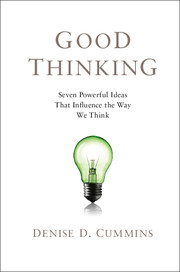Six - What Causes What?
Published online by Cambridge University Press: 05 June 2012
Summary
At bottom, we all have a little bit of the control freak in us. We want to know how to bring about the things and events that we like and how to prevent or terminate the things and events we don’t like. Some of us also just want to know what causes what even if there is nothing we can do about it. We strive for that state of cognitive satisfaction that goes something like this: “Huh! So that’s why that happens.” In order to accomplish these goals, we automatically rely on a very basic concept, one that philosopher John Mackie (1974) dubbed “the cement of the universe”: causality.
The Paradox of Causality
From a psychological viewpoint, causality is a paradox. We use this concept to make sense of events in our everyday lives as wide ranging as why our car didn’t start to why people commit acts of violence. Yet it eludes the senses – it cannot be directly perceived – which led philosopher David Hume (1711–1776) to claim that causality was an “illusion” (Hume, 1748). As he pointed out, if one event causes another, then (a) the two events always co-occur (constant conjunction), (b) they must occur close in time, with the cause preceding the effect (temporal priority), (c) they must occur close in space (spatial proximity), and (d) one event must have the power to bring the other about (necessary connection). Now the paradox: Whereas we can directly perceive the first three, we cannot see the fourth – a necessary connection between events. As a simple example, imagine watching a sledgehammer hit a crystal vase, followed by the vase shattering. Read that sentence again. It contains all the information about the event that is directly perceivable. So you should have something like this in your head: “The hammer hit the vase, and then it shattered.” But that is not what is in your mind right now. In your mind is a proposition like this: “The hammer hit the vase, causing it to shatter.” Where did that term “causing” come from? Causation cannot be directly perceived. That is why Hume claimed that causation is an illusion imposed by the mind, in much the same way that our visual system is subject to various illusions.
- Type
- Chapter
- Information
- Good ThinkingSeven Powerful Ideas That Influence the Way We Think, pp. 99 - 114Publisher: Cambridge University PressPrint publication year: 2012



